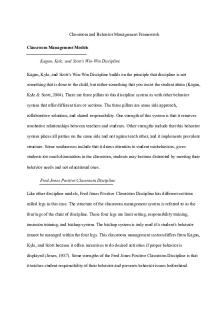Psychology experiments and classroom learning.docx 2019 PDF

| Title | Psychology experiments and classroom learning.docx 2019 |
|---|---|
| Author | ATHANDIWE SAKELA |
| Course | Theory of Education |
| Institution | Walter Sisulu University |
| Pages | 3 |
| File Size | 42.8 KB |
| File Type | |
| Total Downloads | 39 |
| Total Views | 124 |
Summary
class work...
Description
Psychology experiments and classroom learning Teachers have to be concerned especially with those kinds of leaning that are important for the child at school, many of the experiments that are described in this were conducted either in schools or in school-like circumstances. However, in everyday school-life the various different factors which influence learning tend to operate together, simultaneously. In order to make scientific progress despite this complexity, and gain an understanding of the separate effects of each of the many influencing factors, it is often necessary to design experiments in which the normal conditions of day-to-day learning are artificially simplified. Such analytic approach is necessary in most spheres of scientific activity, in order to make progress towards understanding highly complex, multiply determined phenomenal. Consequently, in much of the experimental research that has been conducted by psychologist to investigate learning, the circumstances in which learning occurs are simpler or more straight forward than is customary in real life. Obviously, the relevance to real life of any experimental findings that were obtained in a simplified or artificial situation is such questionable. In order to ensure maximum relevance, such as research needs to be followed up by studies under taken under more realistic conditions. But it is worth stressing that there are often good reasons for psychologists deciding to conduct experiments in which some of the complexities everyday school learning are reduced. We must not forget that all learners are individuals. In real life the unique past experience of every learner is a major influence. One implication of this fact is that, so far as individual learners are concerned, there are inevitable limitations on the validity of generalization that are based on the average performances by participants in experimental research. Research findings can rarely predict precisely what a particular individual will do. A classroom teacher wants to face the challenge of the classroom in easy and effective way. It is possible if the teacher understands the qualities and nature of child and human psychology. The knowledge of educational psychology has a great relevance for the teacher because it helps the teacher to realise his or her objective of effective teaching and educating the pupils properly. Precisely speaking, the knowledge of psychology help the teacher in the following ways. 1. Understanding the child It has been rightly recognised that the teacher can truly teach the child when he or she possess the knowledge of child psychology individual as well as collective. 2. Understanding individuals differences It is presume that all children are more or less alike and therefore, almost same speed of progress was expected from them. From the knowledge of psychology we understand that there are marked differences among children and every child is endowed with specific potentcuities by nature, which a teacher can only help to nature. 9| P a g e
3. Providing knowledge about the laws of learning Teaching can be defined as a cause for children to learn. The knowledge of psychology enlightens the teacher about the way and means in which learning can take place the possible manner. The knowledge of psychology helps the teacher to teach according to the law of learning.
9| P a g e
9| P a g e...
Similar Free PDFs

IB Psychology Guide 2019
- 71 Pages

2019 IB Psychology IA Checklist
- 1 Pages

Harris QCA 8e Experiments
- 125 Pages
Popular Institutions
- Tinajero National High School - Annex
- Politeknik Caltex Riau
- Yokohama City University
- SGT University
- University of Al-Qadisiyah
- Divine Word College of Vigan
- Techniek College Rotterdam
- Universidade de Santiago
- Universiti Teknologi MARA Cawangan Johor Kampus Pasir Gudang
- Poltekkes Kemenkes Yogyakarta
- Baguio City National High School
- Colegio san marcos
- preparatoria uno
- Centro de Bachillerato Tecnológico Industrial y de Servicios No. 107
- Dalian Maritime University
- Quang Trung Secondary School
- Colegio Tecnológico en Informática
- Corporación Regional de Educación Superior
- Grupo CEDVA
- Dar Al Uloom University
- Centro de Estudios Preuniversitarios de la Universidad Nacional de Ingeniería
- 上智大学
- Aakash International School, Nuna Majara
- San Felipe Neri Catholic School
- Kang Chiao International School - New Taipei City
- Misamis Occidental National High School
- Institución Educativa Escuela Normal Juan Ladrilleros
- Kolehiyo ng Pantukan
- Batanes State College
- Instituto Continental
- Sekolah Menengah Kejuruan Kesehatan Kaltara (Tarakan)
- Colegio de La Inmaculada Concepcion - Cebu












